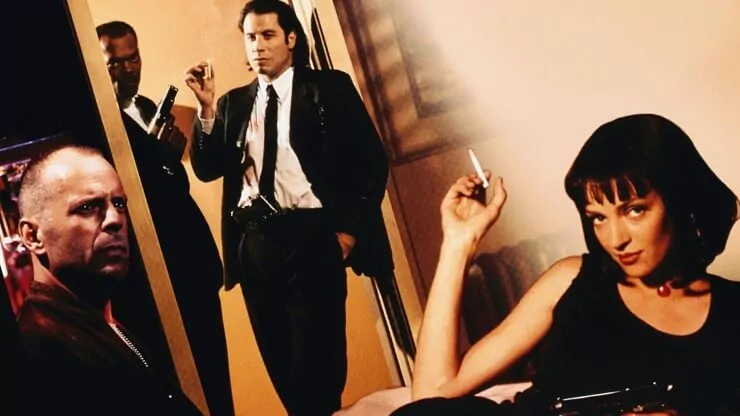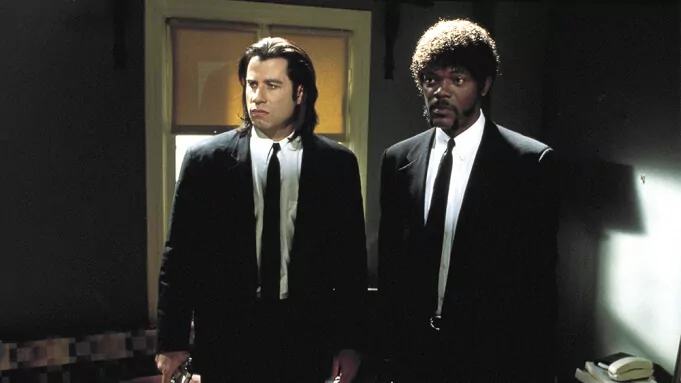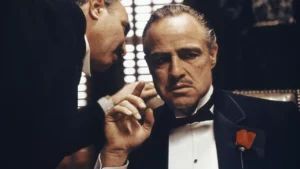
Pulp fiction is arguably the best movie Quentin Tarantino has ever put on screen. While this can be debated, there is no doubt about the fact that it was definitely his breakthrough in the big league of Hollywood.
Pulp Fiction Movie Plot
The plot of pulp fiction is a mixture of different plot points where are non-coherently pieced together. It jumps from characters and settings and follows a very unconventional time structure. To sum up in a sentence, it is based on a briefcase, a Boxer on the loose and a foot massage gone wrong.
Pulp Fiction Movie Cast
- John Travolta as Vincent Vega
- Samuel L. Jackson as Jules Winnfield
- Uma Thurman as Mia Wallace
- Bruce Willis as Butch Coolidge
- Harvey Keitel as Winston Wolfe
- Tim Roth as Ringo
- Ving Rhames as Marcellus Wallace
- Christopher Walken as Captain Koons
Pulp Fiction Movie Review
Pulp Fiction is just like it sounds, a pulp of interconnected fictional stories which are loosely combined with each other, in no particular order. It was a genre defining movie which gave Quentin Tarantino a status like no other director working in Hollywood. Pulp fiction is one of those movies that come out and change the audience’s perception for life. Directed by Quentin Tarantino, Pulp Fiction is an anthology film which plays off the ironies and the insanities of the mafia. It’s a story which will go to any direction and leave no tables unturned. When you least expect it, this movie hits you with the most maniacal twists one can possibly conjure, and I am saying this with utmost appreciation.
Quentin Tarantino’s Pulp Fiction is an amalgam of Conversations
Vincent (John Travolta) and Jules (Samuel L. Jackson) are driving towards an apartment. Both having a conversation about topics like a Big Mac and Metric System in Paris. Arriving at a certain apartment, they start talking about Massages and how Marcellus Wallace killed a guy who gave his wife a foot massage. This is just the beginning of the series of bizarre conversations that take place in this movie. And Pulp Fiction basically thrives on it. These moments of convos are what take this Quentin Tarantino movie forward. You would imagine that back then, a gangster film with no action couldn’t possibly work. The audience’s minds were honed to such extent that promotions relied on explosions instead of dialogue to get a movie across. And this is still the case in Hollywood for most of the big budget cash grab entertainers. So, in the midst of such an ensemble of movies crowding the box office, this movie became one of the most successful movies of recent times, based on pure dialogue and delivery. And oh lord does Pulp Fiction has some good dialogue.
See, if you are creating a movie which is going to be a random cluster of events mashes together, the writer must give the viewers the fun of assembling it, piece by piece which is only possible by writing some truly clever dialogues. The cleverness of this script doesn’t rely on the information that is provided in the conversations, well not completely at least. So many different exchanges in this movie are just pointless random topics which won’t serve anything in the story, yet the characters won’t shut up about them. However, isn’t this as close to realism as we can possibly get. Each one of us has pointless chats which serve no purpose and when we see that happening on the screen in front of us, it’s weird yet it tells us so much about the character. So, in the end, it ultimately serves a purpose.

Pulp Fiction Movie is a prime example of what makes a movie Meta
The references and the call backs are what makes Pulp Fiction so memorable. One moment Mia Wallace said that the Masseur didn’t even touch her feet, only her hands and the next moment during the final interaction between Mia and Vincent, they shook hands. It is so meta in doing these little scenes while simultaneously creating some of the most iconic scenes in the history of cinema. The dance sequence for one, isn’t an instant classic. It took its time and developed a cult following of its own, and the same can be said about so many other scenes in the film.
You might feel like almost 3 hours of exchanges between random characters might be a daunting task, but it’s quite the opposite and one of the very rare times when writing is given much more emphasis rather than action for a movie to work. Pulp Fiction utilizes the wildest and the most far-fetched sequences Quentin Tarantino can think of and presents them in such a peculiar yet gripping manner. I would say that it’s an acquired taste but you would be lying if you said Pulp Fiction is ordinary.
Pulp Fiction Movie Critical Reception
Pulp Fiction stands at 92% on Rotten Tomatoes with the consensus being, “One of the most influential films of the 1990s, Pulp Fiction is a delirious post-modern mix of neo-noir thrills, pitch-black humor, and pop-culture touchstones.” Its Metascore is 94 with universal acclaim based on 24 Critic Reviews.
The Movie Culture Synopsis
Pulp Fiction is what films try to be in recent times. What it has achieved with its writing is an undeniably humongous task which deserves all the accolades and then some more.



